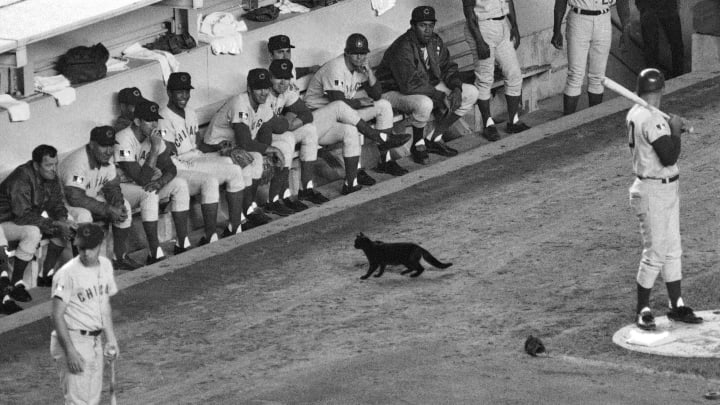Exorcising the Cubs curse - and other baseball superstitions

Erik Williams and Brad Knaub had seen every attempt to exorcise the Curse of the Billy Goat go awry, from intrepid Cubs fans who have smuggled more benevolent goats into Wrigley Field to that Greek Orthodox priest who once sprayed holy water on the dugout.
Yet their beloved Cubs continued to come up short.
Every year.
So, the owners of Carnivore Inc., a company that produces food from responsibly raised animals, decided to take matters into their own hands. They carefully selected a goat from a farm about 90 minutes south of Chicago, had it butchered earlier this week, and proceeded to turn the bleepin' bleater into traditional Merguez sausage at their shop in the Chicago suburbs.
Their hope is that Cubs fans at Wrigley Field on Friday night can collectively lift the plague by devouring their delicacy before Game 1 of their NL divisional series against the Giants.
''The previous attempts to reverse the curse with slaughter and macabre acts are obviously only making things worse,'' Williams said. ''It's time to make Chicagoans love goat.''
Of course, you could write this entire enterprise off as another utterly ridiculous idea from a bunch of crackpot Cubs fans willing to try anything to finally win a World Series.
Or, you could recognize that research has proven it just may work - at least on the field. It turns out that numerous academics, principally psychologists, have been investigating for years and in great detail whether superstitions actually have an effect.
And let's be honest: No sport is rifer with superstitions than baseball.
Nationals pitcher Sean Burnett dutifully puts a poker chip in his back pocket before taking the mound. Rangers pitcher Derek Holland watches a certain part of the film, ''For The Love of the Game,'' the night before he pitches. And Royals outfielder Alex Gordon never stands in the on-deck circle, instead wearing out the perfectly manicured grass in precisely the same spot right next it.
Many players refuse to step on baselines when they're running on or off the field, or use the same glove or wear the same grimy helmet, regardless of how much pine tar is caked on it.
''There's so much failure in this game, and there are so many repetitions, that if you find something that you think makes you go well for a while, why change that up?'' Nationals first baseman Clint Robinson said. ''I can see why baseball would be a superstitious sport.''
Some players call them routines. Others call them habits or quirks or customs. But in truth, that's all just semantics. They're still engaging in some sort of superstition.
And there's a chance they're succeeding because of it.
Researchers at the University of Cologne conducted a series of experiments that found that by ''activating good-luck-related superstitions,'' such as telling someone to keep their fingers crossed, it improved performance in golfing, dexterity, memory and solving anagrams.
They also found superstitions boost confidence, which in turn improves an athlete's performance.
Dutch researchers published an article in "Psychological Science" that reached similar conclusions, and then deduced that superstitions are more pervasive when the stakes are high.
It's hard to get much higher than the playoffs, where the Cubs are shooting for their first World Series title since 1908 - long before Billy Goat Tavern owner Billy Sianis was asked to leave Game 4 of the 1945 World Series because the odor of his pet goat Murphy was bothering other fans. Sianis, as the story goes, declared that day the Cubs would never win another World Series.
Dr. Stuart Vyse, a psychologist and author of "Believing in Magic: The Psychology of Superstition," acknowledges that there is no magic behind superstitions. They don't directly affect performance.
''But,'' he said, ''there is growing evidence it has a psychological effect, that if you believe in luck and engage in a superstition you will actually perform better in a skilled activity. And of course, baseball does involve skill.''
It's worth noting that Vyse grew up a Cubs fan, though he's been rooting for the Red Sox since he moved east. And his father was a lifelong Cubs fan who never saw them win a World Series title.
Now, there are superstitions in just about every sport. Basketball players spin the ball a certain way before taking free throws, and hockey goalies slap the pipes a certain number of times before a faceoff, and many athletes listen to certain playlists before they take the field.
Yet superstitions are more prevalent in baseball, Vyse said, because of the laborious pace of the game. Players need something to fill their minds while they stand in the outfield or sit in the dugout, so they begin to connect success and failure to certain rituals.
''Baseball has all this waiting time and if you don't have anything to fill it with, it can make you kind of anxious,'' Vyse said. ''Even if you're not superstitious, coaches often recommend players develop a pregame ritual, a routine, something that they can focus on to alleviate anxiety.''
How does all this translate to fans? Is it possible the superstitious beliefs of a couple of Chicago sausage connoisseurs, and their slaughter of a goat, can help the Cubs win the World Series?
''In a very loose way, it might be one additional encouragement,'' Vyse mused. ''But there's a much more important function for the fans themselves. These people are not unlike players - their identities are tied up in the local team. Their emotions rise and fall with the fate of the team.
''So especially for the group, superstitions and bonding - it makes people feel connected to the team, as if they play a role, even though they can do nothing but be a good fan.''
---
AP Sports Writer Howard Fendrich contributed to this report.
